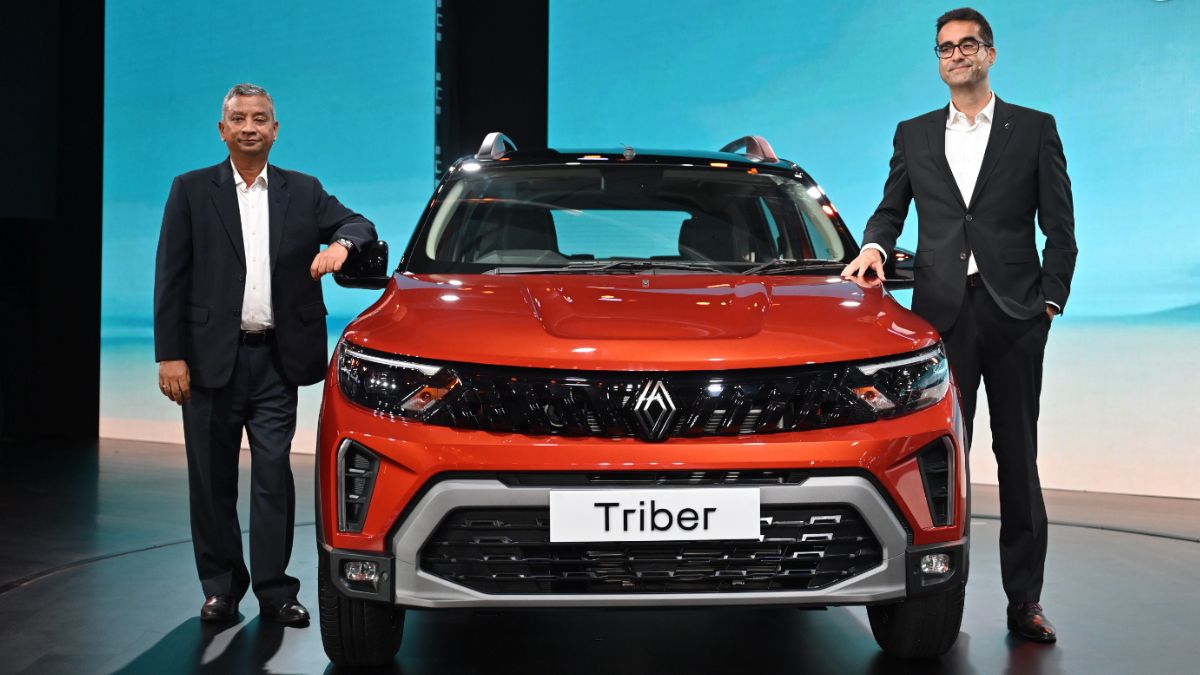Renault launches updated Triber, plans four new cars in two years
 At the launch of the Renault Triber in India | Amey Mansabdar
At the launch of the Renault Triber in India | Amey Mansabdar
French car maker Renault is looking to rev up its India operations with several new product launches as it looks to boost sales and claw back the market share it has lost in the last few years.
Renault sold just 2,552 units in June and had a market share of just 0.9 per cent, according to the Federation of Auto Dealers Association. Pre-COVID, its share was close to 3 per cent.
However, the company has struggled in the last few years, hit hard by the pandemic, the semiconductor crisis and the Russia-Ukraine war, and changing customer preferences towards sports utility vehicles, where the company only has the Kiger currently on offer.
"Renault was selling 540,000 cars in Russia. We had four plants. We shut them down. €3 billion went into the books of France, our mother company, which holds the balance sheet. We were in a disaster mode in Europe. At that point of time, the whole management was focused on the revival of Europe because that's the place where your whole business happens. That took time. Till then, they told us you are on oxygen, we don't have money for you," explained Venkatram Mamillapalle, Managing Director, Renault India.
With European operations improving from 2023, things are looking up globally, he pointed out. The company announced in 2023 that it would invest ₹5,400 crore in India.
The company on Wednesday drove in the updated version of its seven-seater Triber. This is the beginning of Renault's stated intent to launch four new products in India in two years.
The whole endeavour is to get back Renault's market share in India back to the pre-Covid levels "very quickly", and new products and portfolio expansion should help, said Mamillapalle.
The Triber multi-utility vehicle (MUV) has seen decent traction since it was launched six years ago, with total sales of 2.15 lakh units.
Prices of the new Triber start at ₹6.29 lakh ex-showroom for the entry-level model, going up to ₹9.16 lakh for the top-end model.
Renault says the new Triber has 35 updates. The front fascia has been completely redesigned; there's a new grille and advanced LED projector headlamps. Inside, there is a dual-tone dashboard with an 8-inch touchscreen display. It has third-row easy fix seats configurable as 5, 6 or 7-seater.
On the safety front, there are 21 standard features, including six airbags. The Triber will continue to be powered by a 1-litre petrol engine mated to a 5-speed manual transmission. The top-end variant will also get an AMT (automatic manual transmission) gearbox.
India is a key market for the French company. Renault, earlier this year, opened its new design centre in Chennai, which is the largest outside France. The company employs close to 6,000 people in its R&D complex, including over 300 in the design centre.
Renault is also in the process of fully taking over the manufacturing operations in India, which were earlier under the Renault-Nissan joint venture. Renault will continue to make cars for Nissan at the plant.
The company has a network of 350 outlets and is revamping its stores under its Renault rethink strategy, offering a new customer experience.
Sourcing components for global markets is also a big focus area for Renault in India. According to Mamillapalle, Renault is currently sourcing around €170 million worth from India, and as it expands its product lineup with B+ and C segment vehicles, its sourcing will increase.
For now, Renault's focus in India will be on petrol vehicles. One can get a government-approved CNG kit for the Triber fitted at the dealer end.
Renault says it is open to launching vehicles on various technologies, including electric vehicles, but wants the ecosystem to develop first.
"For us, everything is at arm's length. In Europe, you have hybrid electrics, EVs, ethanol, and everything is available. Currently, what we are looking for is the maturity of the market, the regulation and the ecosystem. We will take an appropriate time to announce the launches, and we will be there in India in multi-energy vehicles," said Mamillapalle.
The Ministries, petroleum companies, auto companies, solar companies, etc., will have to work together to put the ecosystem in place for EVs to scale up, he added.
Business